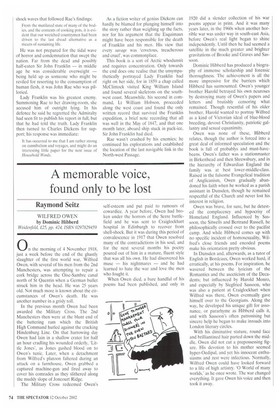A memorable voice, found only to be lost
Raymond Seitz
WILFRED OWEN by Dominic Hibberd Weidenfeld, £25, pp. 424, ISBN 0297829459 0 n the morning of 4 November 1918, just a week before the end of the ghastly slaughter of the first world war. Wilfred Owen, with several of his men from the 2nd Manchesters, was attempting to repair a cork bridge across the Oise-Sambre canal north of St Quentin when a German bullet struck him in the head. He was 25 years old. Not much more is known about the circumstances of Owen's death. He was another number in a grisly toll.
In the previous month Owen had been awarded the Military Cross. The 2nd Manchesters then were at the blunt end of the battering ram which the British High Command hurled against the cracking Hindenburg Line. On that harrowing day Owen had lain in a shallow crater for half an hour cradling his wounded orderly, 'Little Jones', as Jones gushed blood on to Owen's tunic. Later, when a detachment from Wilfred's platoon faltered during an attack on a farmhouse, Owen grabbed a captured machine-gun and fired away to cover his comrades as they slithered along the muddy slope of Joncourt Ridge.
The Military Cross redeemed Owen's self-esteem and put paid to rumours of cowardice. A year before, Owen had broken under the horrors of the Serre battlefield and he was sent to Craiglockhart hospital in Edinburgh to recover from shell-shock. But it was during this period of convalescence in 1917 that Owen resolved many of the contradictions in his soul, and for the next several months his poetry poured out of him in a mature, fluent style that was all his own. He had discovered his muse — his nightmares — and he had learned to hate the war and love the men who fought it.
When Owen died, a bare handful of his poems had been published, and only in


































































































 Previous page
Previous page